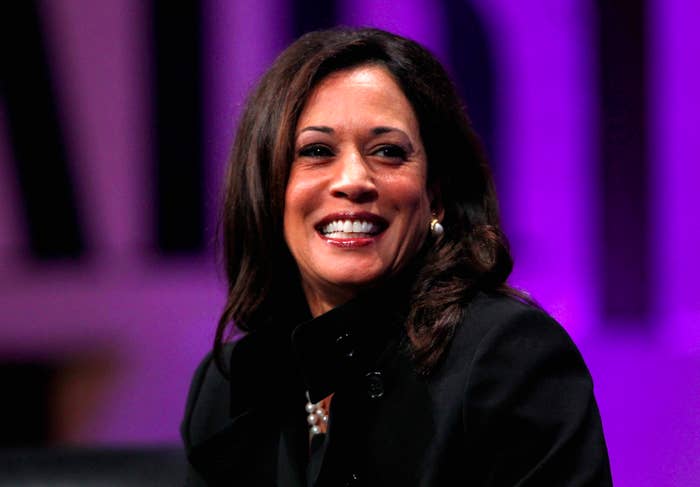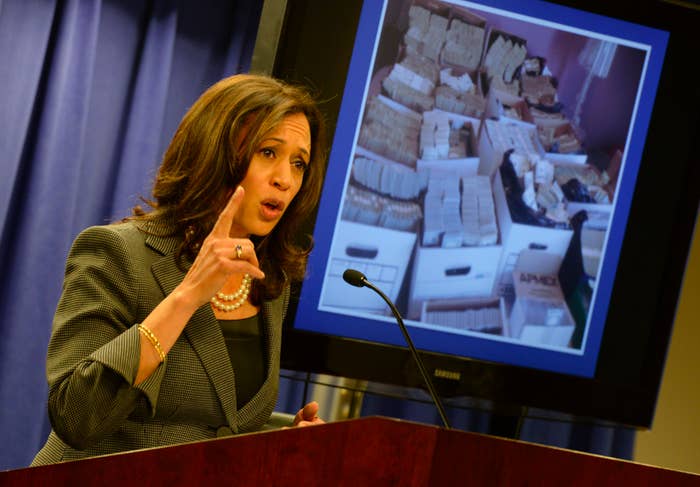
WASHINGTON — California Attorney General Kamala Harris wants people to stop saying "revenge porn."
The term — often used when an ex spreads nude photos or video after a breakup — totally gets it wrong, Harris says. She argues the word "revenge" suggests that someone is justified in sharing a consensual photo, and the word "porn" suggests the victim did something morally wrong.
"We have unfortunately a history around criminal justice policy on crimes against women and children of — especially when it involves sex — blaming the victim, frankly," she told BuzzFeed News on Monday in a wide-ranging interview in the second-floor lounge at the Mayflower Hotel.
This is something done with "the intent and certainly the effect of, at the very least, embarrassing her — but subordinating her in so many ways and really violating not only her privacy but her dignity."
Harris is not having it.
"So we are changing the name, and calling it cyber exploitation," she said. "Which in fact is what's at play."
Harris is one of the Democratic Party's rising stars — a charismatic attorney general in the country's biggest state. She's the state's first black attorney general; she's the state's first Asian-American attorney general; she's the first woman to hold the position. She was considered a strong prospect to succeed Attorney General Eric Holder, and she's certainly considered a strong prospect in California's state politics, where both senators and the governor are reaching the end of their careers.
She is a career prosecutor, a "very conscious decision" she made out of law school, who sometimes clashes with other elements of the party of progressives — even as her stature within the party rises.
Despite all of that, Harris doesn't talk like most strong prospects for national office.
She's not especially attuned to the D.C. news cycle, for one. She favors substantive, legal-process-heavy answers on topics ranging from the situation in Ferguson to a recent Supreme Court case in which her office argued unsuccessfully against requiring police to obtain a search warrant to examine the contents of an arrested person's cell phone. She goes into great detail when discussing her self-described "smart on crime" approach to the job — an attempt to find balance between her roles as prosecutor and partisan.
She also can be disarmingly candid — at one point, while talking about cyber sex crimes she noted that, "since the beginning of time, people would all agree, the camera was created to take a photograph of the naked human body."
She spoke Wednesday at the Center for American Progress' Making Progress Policy Conference, featuring a number of top progressives — Sen. Elizabeth Warren, New York City Mayor Bill de Blasio, and Housing and Urban Development Secretary Julian Castro.
The gathering is taking place as another Democrat, Missouri Gov. Jay Nixon, faces national scrutiny over his handling of the fatal shooting of Michael Brown and the impending grand jury decision whether to indict the man who shot him, police officer Darren Wilson.
Harris is among those watching the situation play out — saying that she is "troubled" by what's been happening there — but quickly broadened the discussion beyond Ferguson.
"If there's a distrust of law enforcement — and, by extension, government — all of the systems break down, at least for certain populations," she said. "When I charge a case … it's in the name of the people and the premise there is that a crime against any of us is a crime against all of us. If there are specific communities that are not receiving the full benefit of the protections we created, it's a problem for all of us."
Asked about the history of distrust between the black community and law enforcement, Harris said, "It's all of our responsibilities to acknowledge it and deal with it where it occurs. And it's not just because it's the morally right thing to do, I believe it's in the best interest of public safety for everyone."
She pointed to training and hiring as the most important counters to tensions between the black community and police — and between the police and other groups in especially diverse, immigrant-heavy California. "It's a matter of those of us in a position of authority and responsibility in law enforcement to understand the culture and the mores of those various communities, so when we walk in there we understand exactly what the perspective of the people we're interacting with might be."
Enter Harris the prosecutor: "It is also a reciprocal relationship, and that's going to be again about leaders, whoever they are, taking on the responsibility for also saying, 'When you get stopped and asked a question, just, just don't run. Stay there and answer the question, if you can. If you, if your lawyer, whatever,'" she paused, reiterating her initial point. "They're reciprocal relationships."
Ferguson also provoked bipartisan criticism of federal programs that provide local police with military equipment for free — a point of discussion that has faded somewhat as the months have passed since the initial protests.
Harris' position as a prosecutor puts her at odds, somewhat, with the national progressive conversation about police issues. She said the militarization of police forces is a "legitimate conversation to be had." But she also said she doesn't think "in general" that police have become too militarized.
"I would say we'd have to look at specifics," she explained. "I don't think in general that's the case, but I think there are certainly examples that concern us about that. Wherever it occurs is a problem for all of us. It's not just about, 'Oh, that's happening over there.' If there is a sense that, by the people, that law enforcement is militarized and is exercising excessive force, that's going to be an issue for everybody and that needs to be addressed."

That tension between the prosecutor and the progressive was on display in last year's case over whether police would need to obtain a search warrant before examining the contents of an arrested person's cell phone.
Asked about it, Harris was first philosophical about the role of technology and the internet in today's society.
"We are at a moment in time, which is really I think an inflection point," she said. "When I think about technology I think of it in the context of, there was the creation of fire, the wheel, electricity, and this. This is a bleeping gamechanger. … It's incredible in terms of its expanse and its potential and the ubiquitous nature of it, right? And so everyone is adapting. We are at this point figuring out, in particular Fourth Amendment privacy."
In figuring that out, Harris' office took the position that police should not need a warrant to search an arrested person's cell phone. "And the court said, 'We disagree,' and I respect the court's decision," Harris said. "So my perspective as of today is respectful of the court's decision."
From smartphone access to sexual assault, Harris' more macro approach to changes in the law — the evolution of the law — was on display, especially in the case of California's affirmative consent law, which requires universities receiving state funds to include the policy.
"I think that the idea behind that is a good one, which is not just about, 'Did she actually say yes?'" Harris said. "Now, there are going to be abuses, and this is part of the argument against that, that can be abused. Good public policy is not crafted around the abuses," she said, adding that the system can "handle and address" such abuses.
Harris also noted that consideration must be given to someone who wants to report an assault, even if the person doesn't want to prosecute it. "So it's a complex issue, right, in terms of how the public policy should be constructed and what's the role of campus police, what's the role of the academic staff, the public health staff of the university."
"I think we're getting smarter, but there's a lot of work to be done."
